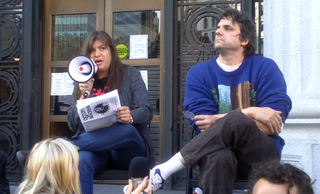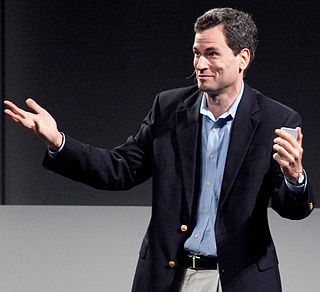A Quote by William J. Clinton
Through scientific discovery and technological innovation, we enlist the forces of the natural world to solve many of the uniquely human problems we face - feeding and providing energy to agrowing population, improving human health, taking responsibility for protecting the environment and the global ecosystem, and ensuring our own Nation's security. Scientific discoveries inspire and enrich us, teaching us about the mysteries of life and the nature of the world.
Quote Topics
About
Discoveries
Discovery
Ecosystem
Energy
Enrich
Ensuring
Environment
Face
Feeding
Forces
Global
Health
Human
Human Health
Human Problems
Improving
Innovation
Inspire
Life
Many
Mysteries
Nation
Natural
Natural World
Nature
Our
Own
Population
Problems
Protecting
Providing
Responsibility
Scientific
Scientific Discovery
Security
Solve
Taking
Taking Responsibility
Teaching
Technological
Through
Uniquely
Us
World
Related Quotes
Humanity is looking for a new story. The one it has embraced since the Renaissance is no longer viable. Despite all of its positive contributions to modern life, three hundred years of scientific-technological development has left our civilization in an untenable position-at odds with its natural environment and ultimately its own deeper, collective, soul. Only a global shift in fundamental perceptions, values, and corresponding actions will allow human-kind to resume an evolutionary pat in alignment with nature and the larger cosmos.
I believe that to meet the challenge of our times, human beings will have to develop a greater sense of universal responsibility. We must all learn to work not just for our own self, family, or nation but for the benefit of all humankind. Universal responsibility is the key to human survival. It is the best foundation for world peace, the equitable use of natural resources, and through concern for future generations, the proper care of the environment.
What keeps me up at night in a negative way is, if we don't solve the problems of the human heart and of the human head, of human psychology, there is no technological solution so great that it can prevent the world that is coming, and a world of suitcase bombs or of the ability to pollute the planet in a way that it cannot recover, of global warming and the rest. We've created through science and technology a different world that has frightening sides to it, and psychology and behavioral science has to be part of this. We're going to have to find a way to humanize the culture itself.
Our colonizers have taught us to believe that our health has improved because of Western medicine, Western foods, and Western technology. In a society that values progress, our colonizers taught us that conditions in the world are perpetually improving, that with each new technological advancement, each new discovery, each new way to utilize resources, each new way to alter the environment, that the world is getting better, that it is advancing. These are all lies.
The natural environment is not particularly hospitable to human life ... the key to having a good environment is improving it through work... . Energy is fundamentally an environmental improver and if we classify it that way it makes sense out of a lot of these controversies... . It's our obligation and our right to make [our environment] as good for human beings as possible. With that view, it's very easy for people to understand precisely the reason it's good to alter it - because it doesn't naturally come the way we need it to be.
Love really is the answer to human problems: love of oneself, love of others, love of where one is, love of what one is doing, love of nature, love of life, love of the world, love of spirit in all its wonder and splendor. Love sets our energy free. It opens us and puts us in a flow with spirit and life on many levels. Love is the true secret behind manifestation.
The earth will continue to regenerate its life sources only as long as we and all the peoples of the world do our part to conserve its natural resources. It is a responsibility which every human being shares. Through voluntary action, each of us can join in building a productive land in harmony with nature.
Until society can be reclaimed by an undivided humanity that will use its collective wisdom, cultural achievements, technological innovations, scientific knowledge, and innate creativity for its own benefit and for that of the natural world, all ecological problems will have their roots in social problems.
Scientific and technological progress themselves are value-neutral. They are just very good at doing what they do. If you want to do selfish, greedy, intolerant and violent things, scientific technology will provide you with by far the most efficient way of doing so. But if you want to do good, to solve the world's problems, to progress in the best value-laden sense, once again, there is no better means to those ends than the scientific way.
I know that there are those who disagree with the overwhelming scientific evidence on climate change. But here's the thing -- even if you doubt the evidence, providing incentives for energy-efficien cy and clean energy are the right thing to do for our future -- because the nation that leads the clean energy economy will be the nation that leads the global economy. And America must be that nation.
Let us admit that most of us writers feel an essential aversion to politics. By taking such a position, however, we accept the perverted principle of specialization, according to which some are paid to write about the horrors of the world and human responsibility and others to deal with those horrors and bear the human responsibility for them.
Nature consists of facts and of regularities, and is in itself neither moral nor immoral. It is we who impose our standards upon nature, and who in this way introduce morals into the natural world, in spite the fact that we are part of this world. We are products of nature, but nature has made us together with our power of altering the world, of foreseeing and of planning for the future, and of making far-reaching decisions for which we are morally responsible. Yet, responsibility, decisions, enter the world of nature only with us
Discoveries are always accidental; and the great use of science is by investigating the nature of the effects produced by any process or contrivance, and of the causes by which they are brought about, to explain the operation and determine the precise value of every new invention. This fixes as it were the latitude and longitude of each discovery, and enables us to place it in that part of the map of human knowledge which it ought to occupy. It likewise enables us to use it in taking bearings and distances, and in shaping our course when we go in search of new discoveries.
Many people have the impression that there is significant scientific disagreement about global climate change. It's time to lay that misapprehension to rest. There is a scientific consensus on the fact that Earth's climate is heating up and human activities are part of the reason. We need to stop repeating nonsense about the uncertainty of global warming and start talking seriously about the right approach to address it.

































